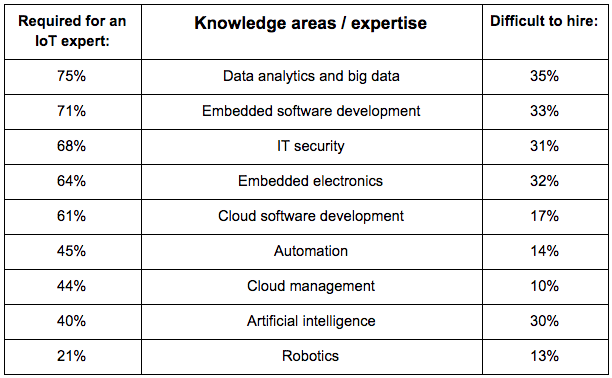Businesses are struggling to recruit employees with the skills needed to make the Internet of Things a success, according to a new IoT Business Models report from Canonical – the makers of the IoT operating system, Ubuntu Core.
The report, which includes research from over 360 IoT professionals, developers and vendors found that 68% are struggling to find and recruit employees with relevant IoT expertise.
According to Canonical’s research, the most difficult to hire IoT employees are those with knowledge of big data and analytics, with 35% of IoT professionals saying they struggle to recruit this skillset.
>See also: How the IoT exacerbates the IT talent gap
Commenting on these findings, Mike Bell, EVP of IoT and Devices at Canonical said, “When it comes to the Internet of Things, the business community is still overcoming a significant skills gap. Many businesses are concerned by their own lack of knowledge and skills within the IoT market and many business leaders are finding themselves running head first into a set of technology and business challenges that they do not yet fully understand.”
Knowledge of big data and analytics was also identified as the most important skillset for IoT professionals, with 75% deeming it a necessity for anyone claiming to be an IoT expert.
The next most hard to find skill-sets for IoT professionals are knowledge of embedded software development (33%), embedded electronics (32%), expertise in IT security (31%) and an understanding of artificial intelligence (30%).

“Businesses need to realise that working in IoT should not require such an extensive variety of skills,” continued Bell. “What is needed, instead, is a simplification of the technologies behind IoT. Within the next five years we expect to see IoT technologies built into all aspects of the business environment. As edge computing brings connected intelligence directly to the shop floor, cloud computing will continue to drive back-end processes across the entire supply chain, for example. With all business processes growing increasingly connected, their supporting IoT technologies must be easy enough for anyone to manage, monitor and use – regardless of their background knowledge or personal skillset.”
>See also: Collaboration is key to closing the skills gap
“Above all, businesses must be agile when it comes to deciding on the ‘right’ people, skills and team to take them forward. What is decided upon today, is unlikely to remain the same in even one or two years, so constantly evaluating what change is needed and being able to execute this quickly is a must.”
The UK’s largest conference for tech leadership, TechLeaders Summit, returns on 14 September with 40+ top execs signed up to speak about the challenges and opportunities surrounding the most disruptive innovations facing the enterprise today. Secure your place at this prestigious summit by registering here










